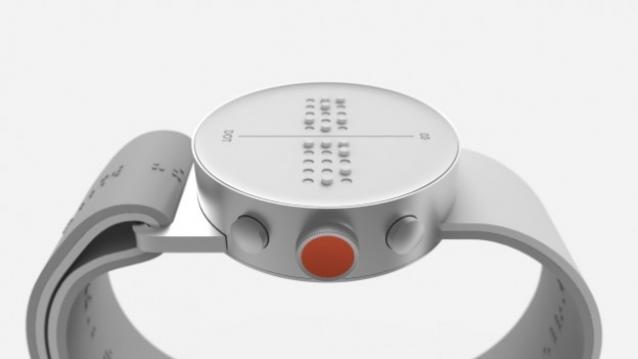- California Assembly OKs highest minimum wage in nation
- S. Korea unveils first graphic cigarette warnings
- US joins with South Korea, Japan in bid to deter North Korea
- LPGA golfer Chun In-gee finally back in action
- S. Korea won’t be top seed in final World Cup qualification round
- US men’s soccer misses 2nd straight Olympics
- US back on track in qualifying with 4-0 win over Guatemala
- High-intensity workout injuries spawn cottage industry
- CDC expands range of Zika mosquitoes into parts of Northeast
- Who knew? ‘The Walking Dead’ is helping families connect
Braille smartwatch developer eyes accessible, affordable technology
SEOUL (Yonhap) — South Korean tech giants such as Samsung Electronics Co. and LG Electronics Inc. have contributed to making life more convenient and easier with a slew of smartphones, mobile payment tools, smartwatches and other innovative products.
But Eric J.Y. Kim, a 25-year-old South Korean entrepreneur, thinks such innovations have yet to reach out to the world’s 285 million people with visual disabilities. And he hopes his tech startup, Dot Inc., will help break down barriers between people and technology.
Dot has succeeded in developing the world’s first braille smartwatch with a price tag of only US$290, aiming to officially put it on the market next year. The price hovers far below the existing braille-translation devices in the market that fetch at least thousands of dollars each.
“When I first personally met a visually impaired person, he had a huge braille book. I wondered how he could carry things like that,” Kim said. “Although there are braille devices in the market, they are expensive, not to mention clumsy.”
Kim, who also tried his hand at other businesses like truck-renting applications before kicking off Dot, says the whole idea is about making smart technologies accessible and affordable for even those with visual disabilities.
“I was very angry at first. The price of braille devices did not change over the past decade,” Kim said. “A lack of affordable braille tools in the market has led to high unemployment among blind people around the globe.”
The smartwatch, which looks like a typical, neat wearable device, links to smart devices and translate messages and e-mails into braille.
Kim said the braille-based smartwatch can revolutionize how people with disabilities use smart devices, as the existing voice-based navigation system has trouble in outdoor settings due to noises.
According to Dot, it has received around 1,600 preorders for the smartwatch. But Kim said sales will grow further down the road, with the company’s first-year target standing at 10 billion won (US$8.63 million).
Dot plans to produce 100,000 units of the smartwatches in 2016. The languages currently available are Korean and English, but the company will continue to expand to cover Japanese and Chinese in the future.
A handful of users have already tested the braille smartwatch, including notable figures such as Italian singer Andrea Bocelli, according to Kim.
“Bocelli said the smartwatch is his light,” he said, “Such responses from home and abroad continued to motivate him. Not only blind people, but also their families have expressed interest in the smartwatch.”
The braille smartwatch is also useful for people who are not yet blind, but losing their sight quickly, Kim said, adding that Dot’s products can be used as “bridge devices” that help patients adjust to the changes.
For people with visual disabilities, the braille smartwatch is not just a new fancy gadget, but a revolutionary tool that can change their lifestyle.
Painting a rosy picture of the braille smartwatch, Kim said he is dreaming of something far beyond just selling an affordable braille smartwatch.
Kim’s 12-member company is also conducting a joint project with the Korea Advanced Institute of Science and Technology that will allow visually impaired people to touch not only sentences but also pictures.
The company also plans to provide a braille navigation system at major subway and bus stops to abate hurdles people with visual disabilities may face on a daily basis. Small modules that directly connect to smartphones and braille tablet PCs are also one of the numerous products envisioned by Dot.
In order to make such visions come true, Dot is currently in talks with global online giant Google Inc. and Amazon.com Inc. for possible business cooperation.
“We wish to forge ties with such firms to expand the contents provided through our braille platform, for example, with cooperation with Amazon’s Kindle,” Kim said.
The company is also in negotiations with retailers, such as Apple stores, so that more people can easily purchase the device.
Despite the pressure as a businessman to generate profits, Kim says his goal is to make the price even more affordable in the future.
“I will continue efforts to keep the price low. The whole project was about bringing alternatives to over-priced braille devices,” Kim said. “This is not just an issue for those with visual disabilities, but also for their families as well. I never felt such joy bringing solutions to problems before.”


















Pingback: Affordable Home Plans With Photos | magazine - super decorating ideas